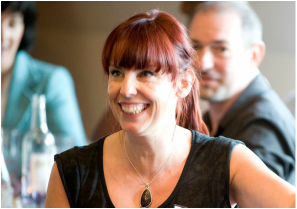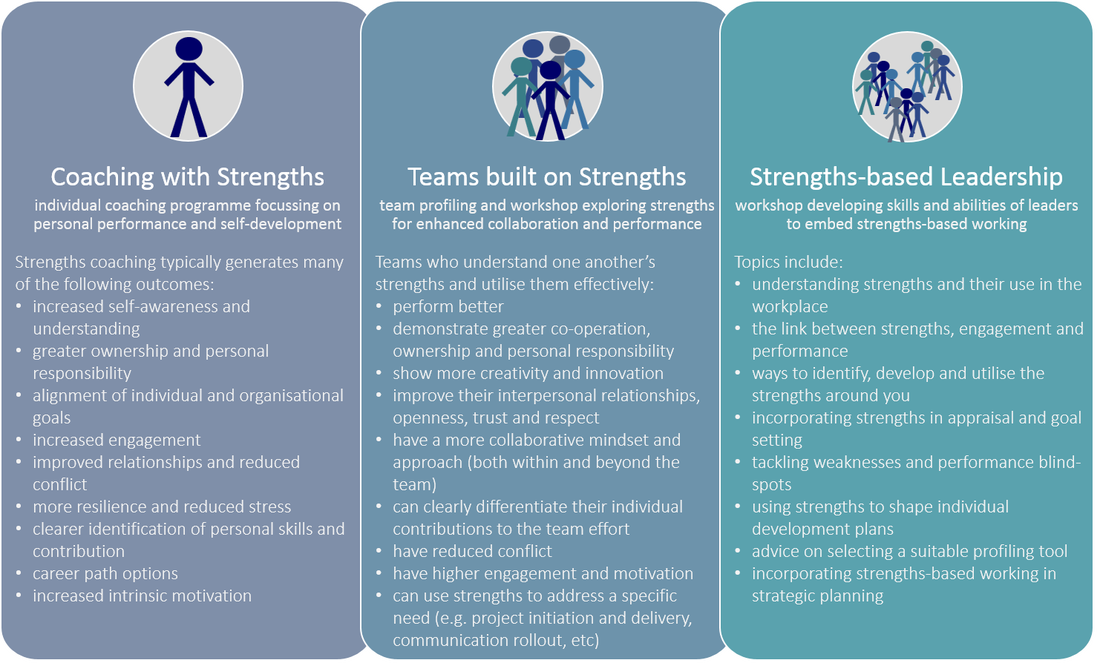|
USING STRENGTHS
Using strengths is the best way to turn good performance into great performance. Strengths are things we:
Using them is intrinsically motivating – it is its own reward. Developing a strength is easier (and more fun) than trying to correct a weakness. Many high performing teams are so effective because they make the best use of the strengths of their members. |
Great managers and leaders recognise and leverage the strengths of their staff. Staff who have a 'strengths mindset' are better able to articulate what they bring to the team and value the contribution of others more.
What does ThinkingOn do?
ThinkingOn has a variety of programmes to help individuals and teams to understand themselves better and plan how to use and develop their strengths fully. We also work with teams to explore their strengths together to create powerful goals for individual and collective performance.
ThinkingOn has a variety of programmes to help individuals and teams to understand themselves better and plan how to use and develop their strengths fully. We also work with teams to explore their strengths together to create powerful goals for individual and collective performance.
“I've really enjoy working with ThinkingOn as their approach is so enthusiastic. With their strengths programme they are able to connect with the least engaged in a team and have enabled us to start building a team plan for the coming year. They are encouraging, motivating coaches.” |
A broad strengths solution
ThinkingOn helps you to deliver outstanding business performance through enabling your people to give their best. We take a pragmatic approach to strength-based working. Our ethos is to use strengths in the service of the organisation. By combining best practices drawn from psychology with a clear understanding of the needs of your team and company, we can select the most relevant strategy and techniques for your situation.
We can support all of the following activities:
ThinkingOn helps you to deliver outstanding business performance through enabling your people to give their best. We take a pragmatic approach to strength-based working. Our ethos is to use strengths in the service of the organisation. By combining best practices drawn from psychology with a clear understanding of the needs of your team and company, we can select the most relevant strategy and techniques for your situation.
We can support all of the following activities:
- incorporating strengths-based working in your strategic plan
- developing leaders and managers at all levels to understand and embed strengths-based working
- profiling for individuals and teams, and advice on selecting an appropriate strength profiling tool
- individual coaching to explore, develop and utilise a strengths profile
- upskilling of leaders and managers to identify, develop and make best use of the strengths within their teams
- diagnostic and action planning with teams to address specific needs (see 'What effect do strengths have?' below)
- evaluating the progress and success of teams who have used a strength-based approach
“ThinkingOn created a very safe environment allowing the team to open up and share their strengths, see a different perspective, and try new things. ThinkingOn had clear belief in me as the manager and helped me to focus on what is important, to create better - more open and honest - relationships with the team.”
why are strengths important?
Human beings are great at noticing when things are wrong (our natural ‘negativity bias’). So we're good at spotting faults in ourselves and others.
Typical organisations place disproportionate emphasis on failures in performance rather than successes. Without realising it, appraisal conversations dwell on under-achievement, weaknesses and shortcomings.
Typical organisations place disproportionate emphasis on failures in performance rather than successes. Without realising it, appraisal conversations dwell on under-achievement, weaknesses and shortcomings.
Why existing efforts to fix performance don't work
We labour under the belief that fixing the things we do poorly will lead to better performance - so we create development plans which focus on filling ‘gaps’. Some organisations introduce competency frameworks, inadvertently implying that reaching proficiency is the goal, rather than striving for excellence.
But research shows that focusing on weaknesses is demotivating and generates poorer performance, not greater. If we want greater performance we need a different approach.
But research shows that focusing on weaknesses is demotivating and generates poorer performance, not greater. If we want greater performance we need a different approach.


